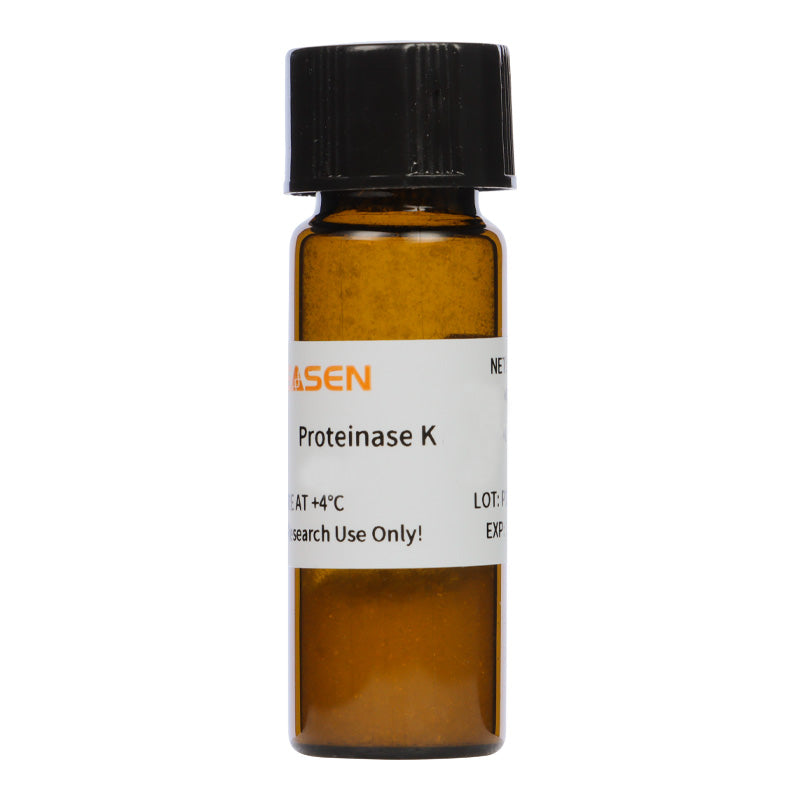Description
Proteinase K is a serine protease with wide cleavage activity, which can cleave the carboxyl-terminal peptide bond of aliphatic and aromatic amino acids. Its relative molecular weight is about 29.3 kDa. Proteinase K is widely used in the preparation of chromosomal DNA for pulse electrophoresis, Western blotting, and the removal of a nuclease from DNA and RNA preparation. Denaturant such as SDS (1%) can improve its activity. In addition, the common working concentration is 50-100 μg/mL, and the specific working concentration is according to whether the buffer contains SDS, urea, pH, temperature, and other factors.
Applications
- Genomic DNA extraction
- Digestion and removal of the enzyme
Specifications
| Source | Yeast |
| Specific Activity | ≥30 U/mg |
| Unit Definition | One unit is defined as the amount of proteinase K that will liberate 1μmoL tyrosine per minute at 37℃ @ pH 7.5. |
| Purification | Ni column affinity purification |
| Reaction Condition | The reaction buffer should be incubated at 37℃ -70℃ for 1h, and the recommended reaction temperature is 70℃. |
| Inactivation method | The reaction system can be inactivated by adding PMSF or DFP inhibitor and partially inactivated by incubation at 65℃ for 10-15 min. |
| Activity Range | It has activity in a wide range of pH (4.0-12.0) and the optimal pH range is 7.5-9.0. |
| RNase and DNase | None |
Components
| Components No. | Name | 10401ES60 | 10401ES80 | 10401ES90 | 10401ES98 |
| 10401 | Proteinase K | 100 mg | 1 g | 5 g | 100 g |
Shipping and Storage
The product is shipped with ice packs and can be stored at 2℃ ~ 8℃ for three years.
[1] Li W, Qiu S, Chen J, et al. Chimeric Antigen Receptor Designed to Prevent Ubiquitination and Downregulation Showed Durable Antitumor Efficacy. Immunity. 2020;53(2):456-470.e6. doi:10.1016/j.immuni.2020.07.011(IF:22.553)
[2] Zhang Z, Mou Z, Xu C, et al. Autophagy-associated circular RNA hsa_circ_0007813 modulates human bladder cancer progression via hsa-miR-361-3p/IGF2R regulation. Cell Death Dis. 2021;12(8):778. Published 2021 Aug 7. doi:10.1038/s41419-021-04053-4(IF:8.469)
[3] Ni H, Qin H, Sun C, et al. MiR-375 reduces the stemness of gastric cancer cells through triggering ferroptosis. Stem Cell Res Ther. 2021;12(1):325. Published 2021 Jun 5. doi:10.1186/s13287-021-02394-7(IF:6.832)
[4] Chen S, Jia Z, Cai M, et al. SP1-Mediated Upregulation of Long Noncoding RNA ZFAS1 Involved in Non-syndromic Cleft Lip and Palate via Inactivating WNT/β-Catenin Signaling Pathway. Front Cell Dev Biol. 2021;9:662780. Published 2021 Jun 29. doi:10.3389/fcell.2021.662780(IF:6.684)
[5] Ma J, Chen S, Hao L, et al. Hypermethylation-mediated down-regulation of lncRNA TBX5-AS1:2 in Tetralogy of Fallot inhibits cell proliferation by reducing TBX5 expression. J Cell Mol Med. 2020;24(11):6472-6484. doi:10.1111/jcmm.15298(IF:4.486)
[6] Shi L, Gong Y, Zhuo L, Wang S, Chen S, Ke B. Methyltransferase-like 3 upregulation is involved in the chemoresistance of non-small cell lung cancer. Ann Transl Med. 2022;10(3):139. doi:10.21037/atm-21-6608(IF:3.932)
[7] Ma J, Chen S, Hao L, et al. Long non-coding RNA SAP30-2:1 is downregulated in congenital heart disease and regulates cell proliferation by targeting HAND2. Front Med. 2021;15(1):91-100. doi:10.1007/s11684-020-0778-5(IF:3.297)
[8] Huang Q, Xie Y, Yang Z, et al. The cytoplasmic loops of AgrC contribute to the quorum-sensing activity of Staphylococcus aureus. J Microbiol. 2021;59(1):92-100. doi:10.1007/s12275-021-0274-x(IF:2.845)
[9] Guo T, Xing Y, Chen Z, et al. Core-binding factor beta is required for osteoblast differentiation during fibula fracture healing. J Orthop Surg Res. 2021;16(1):313. Published 2021 May 14. doi:10.1186/s13018-021-02410-9(IF:2.359)
[10] Zhang W, Zhang T, Yan Y, et al. Exosomal miR-22-3p Derived from Chronic Rhinosinusitis with Nasal Polyps Regulates Vascular Permeability by Targeting VE-Cadherin. Biomed Res Int. 2020;2020:1237678. Published 2020 Nov 12. doi:10.1155/2020/1237678(IF:2.276)
[11] Cheng L, Yi X, Shi Y, et al. Abnormal lipid metabolism induced apoptosis of spermatogenic cells by increasing testicular HSP60 protein expression. Andrologia. 2020;52(11):e13781. doi:10.1111/and.13781(IF:1.951)
[12] Zhang T, Zhou Y, You B, et al. miR-30a-5p Inhibits Epithelial-to-Mesenchymal Transition by Targeting CDK6 in Nasal Polyps. Am J Rhinol Allergy. 2021;35(2):152-163. doi:10.1177/1945892420939814(IF:1.943)
Payment & Security
Your payment information is processed securely. We do not store credit card details nor have access to your credit card information.
Inquiry
You may also like
FAQ
The product is for research purposes only and is not intended for therapeutic or diagnostic use in humans or animals. Products and content are protected by patents, trademarks, and copyrights owned by Yeasen Biotechnology. Trademark symbols indicate the country of origin, not necessarily registration in all regions.
Certain applications may require additional third-party intellectual property rights.
Yeasen is dedicated to ethical science, believing our research should address critical questions while ensuring safety and ethical standards.

